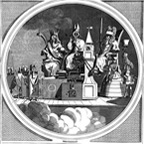The article provides a comparative analysis concerning the war powers of the Executive Branch in the British and in the American experiences; the aim is to understand if the evolution of the constitutional war powers in the United Kingdom could influence the debate on the interpretation of the war powers in the US Constitution. More specifically, the issue concerns the recent constitutional convention that seems to have introduced in the unwritten British Constitution the Parliament’s power of prior approval of the decision to send troops into conflict situations and the possible impact that this important innovation may have on the controversial interpretation of the war powers in the American Constitution. There is, in fact, a profound historical-constitutional link connecting these two legal system and their parallel evolution.
The second section describes how the British configuration of the war powers has historically influenced the American model. The third section explains how, despite the profound differences existing between these two legal systems, the nature of the constitutional war powers of the British Executive has been in substance for a long time similar to the interpretation and application of the war powers of the US President as Commander in Chief; until the beginning of the new millennium, in fact, both in the UK and in the United States the war powers have evolved on parallel lines as a discretionary power of the Executive. This framework, as explained in the fourth section, has changed since the UK Cabinet Manual of 2011 recognized the existence of a new convention of the Constitution according to which every significant military action of the UK now seems to be subjected to a previous debate in Parliament (while in the United States, though the matter of the constitutional war powers is still controversial, the strict interpretation of the War Powers Clause established in favor of the Congress prevails). The fifth section tries to suggest some arguments to explain why the evolution of the constitutional war powers and the strengthening of the Parliament’s role in the UK could influence the debate on the interpretation of the war powers in the US Constitution, in the sense of suggesting a reconsideration of the Congress role. This relates to the more general issue of the influence that foreign law and comparative law can exert on the evolution of the constitutional systems. […]
Scarica il testo in formato PDF
TABLE OF CONTENTS: 1. Introduction. – 2. From the Commander in Chief in the Kingdom of Great Britain to the Commander in Chief in the Philadelphia Constitution. The Influence of the British Model in the Configuration of the Power to Deploy Troops Overseas as a Royal Prerogative Power. – 3. The Parallel Evolution of the Constitutional Power of Political Command of the Armed Forces in the British Unwritten Constitution and in the American Living Constitution. – 4. The Genesis of the New Constitutional Convention that Limits the Prerogative Power of the British Government to Send Troops in Conflict Situations to the Advantage of the Parliament. – 5. The Possible Influence of the Evolution of UK Constitutional War Powers on the Interpretation of War Powers in the US Constitution.






